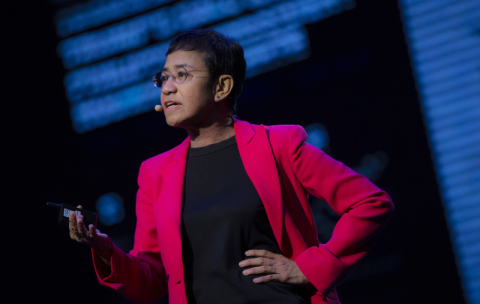
ICFJ’s latest research out today analyzes the intensity and ferocity of online violence against one of the world’s best journalists, Maria Ressa in the Philippines. The report, published this International Women’s Day, seeks to combat a problem that is horrifyingly pervasive for women journalists the world over.
The daily attacks amount to an onslaught of online violence directed against Maria and Rappler, the independent news outlet she co-founded. What’s more, the abuse has paved the way for Maria’s prosecution in the Philippines, where she faces potentially a lifetime behind bars on trumped-up legal charges.
The groundbreaking collaborative case study led by ICFJ Global Director of Research Julie Posetti used a forensic analysis of Twitter and Facebook posts. Rappler analytics staff and University of Sheffield computer scientists collected and analyzed the posts.
What the study reveals is deeply troubling:
- Almost 60% of the attacks in the data we analyzed were designed to undermine Maria’s professional credibility and public trust in her journalism.
- These attacks on her credibility frequently deployed disinformation tactics conflating Maria and her coverage with “fake news.”
- Over 40% of the attacks studied targeted Maria on a personal level - and the most prevalent were sexist, misogynistic and explicit.
Maria, who won ICFJ’s Knight International Journalism Award in 2018, isn’t alone. She is the canary in the coal mine for independent journalists everywhere. A UNESCO-ICFJ study shows that one in five women journalists surveyed suffered attacks or abuse in the physical world stemming from online harassment.
Here’s what we’re doing about it:
- Shedding light on the problem and providing the evidence needed to trigger action: The study out today is part of ICFJ’s ongoing research into online violence against women journalists. Read more and share.
- Providing support: Today, with the International Women’s Media Foundation, we are announcing the Online Violence Response Hub, making it easier for women journalists facing abuse to get help. Register for updates.
- Speaking out: We are co-leading a campaign in defense of Maria through the #HoldTheLine Coalition, a group of 80-plus organizations. Among other things, we are engaging journalists around the world to raise awareness on social media. Order a #CourageOn or #HoldTheLine mask, post your photo and show your support for Maria. Take action here.
We stand with Maria and all women journalists under attack. As Maria so eloquently advised: “Don’t shut up.” We won’t.